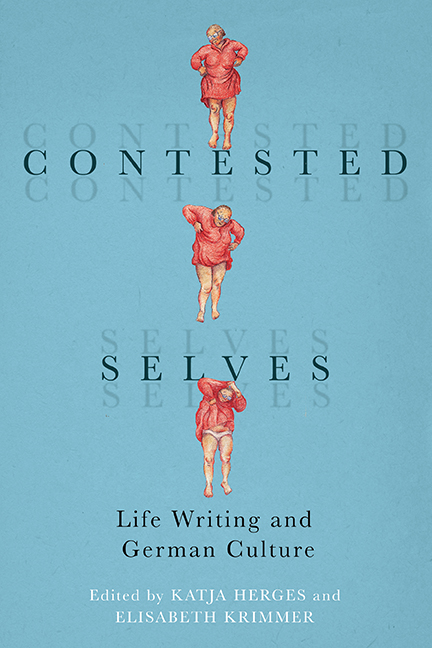Book contents
- Frontmatter
- Contents
- Acknowledgments
- Introduction
- Part I Women’s Life Writing, Female Subjectivity and Agency
- Part II Modern Life Writing and Aesthetics
- Part III Trauma and Vergangenheitsbewältigung
- Part IV Transnational and Transgenerational Life Writing in Contemporary Germany
- Bibliography
- Notes on the Contributors
- Index
6 - Writing Two Selves: A Woman’s Struggle to Cope with War
Published online by Cambridge University Press: 26 May 2022
- Frontmatter
- Contents
- Acknowledgments
- Introduction
- Part I Women’s Life Writing, Female Subjectivity and Agency
- Part II Modern Life Writing and Aesthetics
- Part III Trauma and Vergangenheitsbewältigung
- Part IV Transnational and Transgenerational Life Writing in Contemporary Germany
- Bibliography
- Notes on the Contributors
- Index
Summary
IT IS A LITTLE-KNOWN FACT that the National Socialists encouraged the German population to record their lives. The regime hoped that Germans would think autobiographically at community camps or when they were fighting at the front. Both at home and at war, such testimonies were intended to glorify the regime. In fact, German soldiers often went to war with cameras and preprinted diaries in which they were meant to record their victories. Of course, as the war progressed there were few such victories. At the same time, Germans could not write about the vicious and arbitrary nature of repression exercised by the regime on its citizenry, since such frank recordings of everyday life and any form of political criticism in general were prohibited. Those who kept diaries nonetheless often wrote out of a sense that the historical events unfolding before their eyes needed to be documented for posterity. For example, the journalist Ruth Andreas-Friedrich decided to keep a diary on “10. November” when “die Synagogen brannten” (when the synagogues burned). Her purpose was ultimately a redemptive one. In her published diary's foreword she wrote, “Wie schwer es war, zwischen Bomben und Trümmern, bespitzelt, verdächtigt, durch Verordnungen eingeengt, abgetrennt von der Wahrheit, einzig und allein auf Gerüchte angewiesen, oft ohne Verkehrsmittel, ohne Strom, Gas, Wasser und Telephon, selbst die einfachsten Hilfsaktionen durchzuführen—, das aufzuzeigen ist die Absicht meines Buches” (It was very difficult to make even the smallest efforts to help: between bombs and rubble, spied upon and suspected, hemmed in by regulations, divorced from the truth, reliant solely on rumors, often going without transportation, electricity, gas, water, and telephone—to show that is the intention of my book).
Diaries are texts written for the writer's own use; as such, they can help writers cope with threatening, confusing, or stressful situations. Because authors write diaries to address inner needs and often see themselves as the only audience, diaries are the product of a practice that is allusive and fragmentary. Often, diaries are confessional, intimate texts that cultivate selfhood and record everyday life. Felicity Nussbaum observes, “The diary is … secret … [it] rests uneasily on the perplexing boundary edge between the private and public worlds. And it is in that privatization of the self, that division between public and private self, that the journal is born… . it is a private working out.”
- Type
- Chapter
- Information
- Contested SelvesLife Writing and German Culture, pp. 131 - 146Publisher: Boydell & BrewerPrint publication year: 2021



